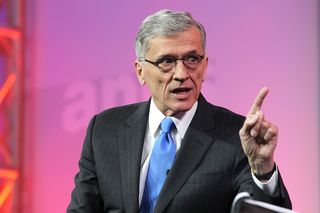Wheeler Whacks Trump Spectrum Plan

WASHINGTON — Former Federal Communications Commission chairman Tom Wheeler has taken aim at the Trump administration’s 5G strategy. In a New York Times op-ed, he argues the administration was giving short shrift to cybersecurity at great risk to networks that could be vulnerable to hacks by the Chinese, Russians and others.
Clearly there is reason for concern, with the “internet of everything” implicating two-way capabilities on connections to our cars, energy grid, financial fortunes and “virtually” everything else. Wheeler’s piece, though, leaves out some of the elements that could provide a more balanced picture of that response.
For example, Wheeler cited an October presidential memo that talks about the “imperative” of being first in 5G as a competitive issue in a race with China. “Nowhere in the president’s directive, for instance, was there a word about protecting the cybersecurity of the new network,” he wrote.
The memorandum Wheeler cited was one focused on spectrum policy rather than network security. It was praised last week by NCTA–The Internet & Television Association in its comments to the administration on that spectrum strategy.
Public Knowledge, the public-interest group that’s no fan of many of the president’s policies, saw no similar cybersecurity deficiency in the spectrum memorandum, calling it a “pragmatic, common-sense approach to developing a sustainable spectrum policy to guarantee our wireless future that maintains American leadership while continuing to meet our public safety and national security needs.”
Wheeler did not mention that in the month before the spectrum memorandum, the White House had issued a separate National Cyber Strategy directive that promised to “defend the homeland by protecting networks, systems, functions and data.”
That built on an executive order from the year before, “Strengthening the Cybersecurity of Federal Networks and Critical Infrastructure,” which laid the groundwork for the directive, according to the White House.
Multichannel Newsletter
The smarter way to stay on top of the multichannel video marketplace. Sign up below.
President Donald Trump has been criticized on both sides of the aisle for lifting a ban on imports of U.S. tech to Chinese telecom ZTE, a company identified as a potential national security threat by almost all the major intelligence agencies due to alleged ties to China’s government. But the administration has taken steps to try and keep Chinese tech out of U.S. networks — Wheeler conceded that point, but is underwhelmed by the effort, as are some Democrats in Congress. “The administration must now move beyond vague policy proposals and into concrete action,” Sen. Mark Warner (D-Va.), vice chair of the Senate Intelligence Committee said, of that strategy.
Wheeler criticized the Trump administration and the “screams of protest” from the wireless industry over a suggestion that a 5G network might have to be nationalized to ensure its security, though he failed to mention that the criticism of that proposal came from both sides of the aisle.
The disclosure at the end of the piece identifies Wheeler as the former FCC chairman and cites his new book, but leaves out his former roles as head of cable and wireless ISP associations NCTA and CTIA.
Such disclosure could have buttressed his point about the “screaming” industry, since he is biting the ISP hands that used to feed him. But it could also have given Wheeler’s readers pause when he said the lack of innate network security stems from how the internet was designed and “isn’t the fault of the companies that built the networks,” though that is a generally accepted point about network architecture.
In either case, disclosure would have allowed the readers to make that call for themselves.
Contributing editor John Eggerton has been an editor and/or writer on media regulation, legislation and policy for over four decades, including covering the FCC, FTC, Congress, the major media trade associations, and the federal courts. In addition to Multichannel News and Broadcasting + Cable, his work has appeared in Radio World, TV Technology, TV Fax, This Week in Consumer Electronics, Variety and the Encyclopedia Britannica.

